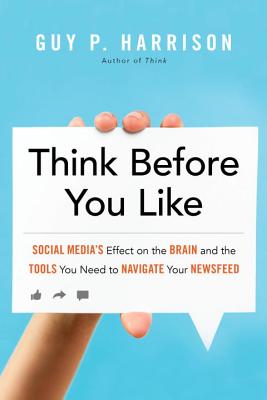Think Before You Like: Social Media's Effect on the Brain and the Tools You Need to Navigate Your Newsfeed

Huge savings for students
Each student receives a 50% discount off of most books in the HSG Book Store. During class, please ask the instructor about purchase details.| List Price: | $18.00 |
| Price: | $9.00 |
| You Save: | $9.00 |
0At a time when the news cycle turns on a tweet, journalism gets confused with opinion, and facts are treated as negotiable information, applying critical thinking skills to your social media consumption is more important than ever. Guy P. Harrison, an upbeat advocate of scientific literacy and positive skepticism, demonstrates how critical thinking can enhance the benefits of social media while giving users the skills to guard against its dangers. Social media has more than two billion users and continues to grow. Its widespread appeal as a means of staying in touch with friends and keeping up with daily news masks some serious pitfalls-- misinformation, pseudoscience, fraud, propaganda, and irrational beliefs, for example, presented in an attractive, easy-to-share form. This book will teach you how to resist the psychological and behavioral manipulation of social media and avoid the mistakes that millions have already made and now regret. Harrison presents scientific studies that show why your subconscious mind loves social media and how that can work against your ability to critically evaluate information. Among other things, social media reinforces your biases, clouds your judgment with images that leave a false impression, and fills your brain with anecdotes that become cheap substitutes for objective data. The very nature of the technology keeps you in a bubble; by tracking your preferences it sends only filtered newsfeeds, so that you rarely see anything that might challenge your set notions. Harrison explores the implications of having digital "friends" and the effects on mood, self-esteem, and the cultivation of friendship in the real world. He discusses how social media affects attention spans and the ability to consider issues in depth. And he suggests ways to protect yourself against privacy invasion, cyberstalking, biased misinformation, catfishing, trolls, misuse of photos, and the confusion over fake news versus credible journalism.
Prometheus Books
